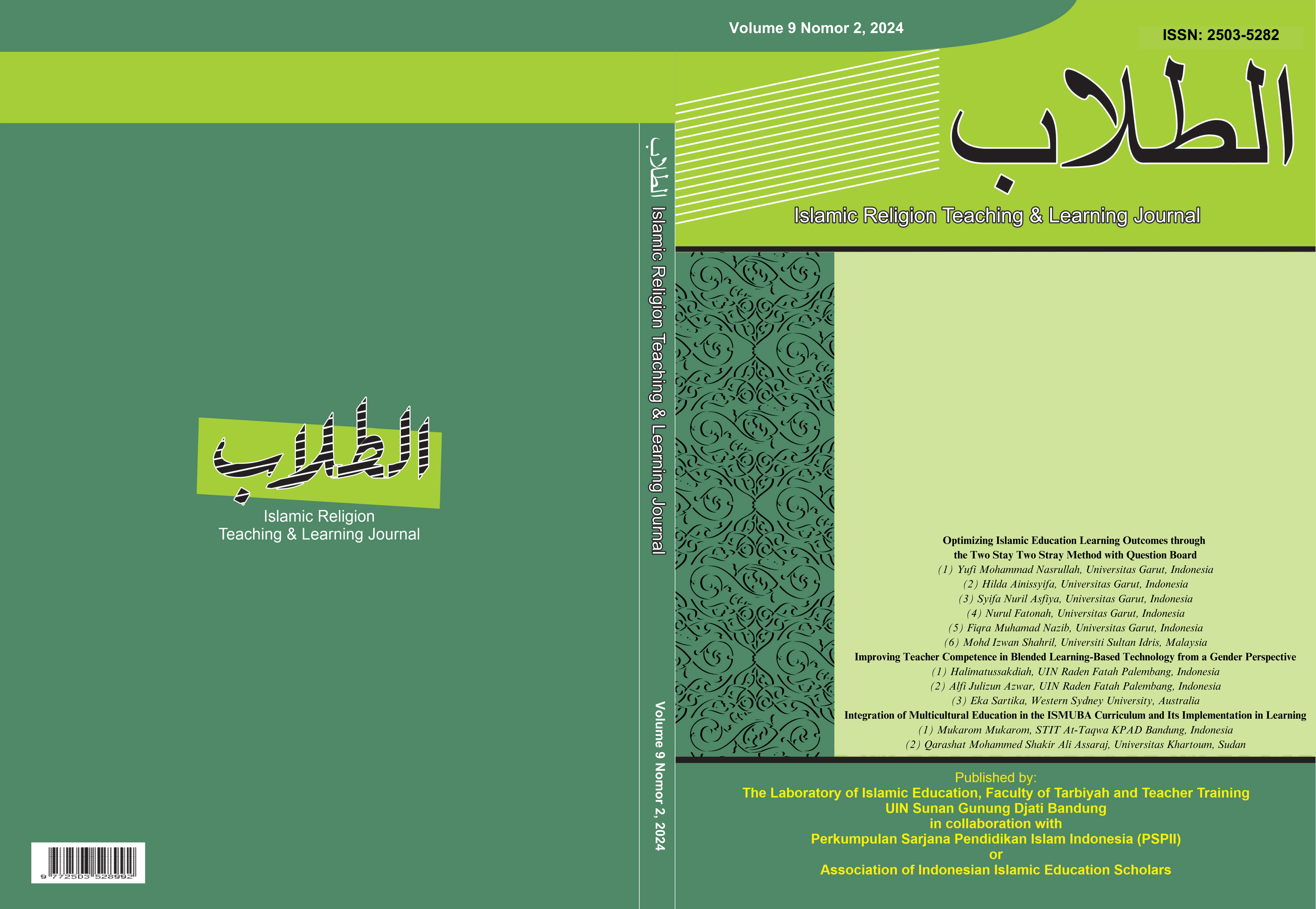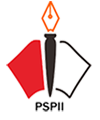Islamic Religious Education in the National Education System: Opportunities and Challenges for Character Building
DOI:
https://doi.org/10.15575/ath.v9i2.33377Keywords:
Curriculum Reform, National Education System, Spiritual DevelopmentAbstract
This research aims to provide an in-depth understanding of the concept of Islamic Religious Education (PAI) in the context of Indonesia's national education system. It analyzes the role of PAI in shaping the character, morals, and spirituality of students to produce individuals who are devout, pious, and possess noble character. Using a qualitative case study approach, data was collected through interviews, direct observation, and analysis of relevant documents. The findings highlight that although PAI plays a crucial role in character development, there are challenges such as limited instructional time, lack of interest from students, and a disconnect between religious and general education. The study suggests reforming PAI through innovative teaching strategies, increased family support, and professional development for teachers. The research concludes that PAI has significant potential to contribute to character education in Indonesia, forming morally sound individuals who contribute positively to society. Penelitian ini bertujuan untuk memberikan pemahaman mendalam mengenai konsep Pendidikan Agama Islam (PAI) dalam konteks sistem pendidikan nasional Indonesia. Penelitian ini menganalisis peran PAI dalam membentuk karakter, moral, dan spiritual siswa untuk menghasilkan individu yang beriman, bertakwa, dan berakhlak mulia. Menggunakan pendekatan kualitatif dengan studi kasus, data dikumpulkan melalui wawancara, observasi langsung, dan analisis dokumen terkait. Hasil penelitian menunjukkan bahwa meskipun PAI berperan penting dalam pengembangan karakter, terdapat tantangan seperti keterbatasan waktu pengajaran, rendahnya minat siswa, dan ketidakselarasan antara pendidikan agama dan umum. Penelitian ini menyarankan reformasi PAI melalui strategi pembelajaran inovatif, peningkatan dukungan keluarga, dan pengembangan profesionalisme guru. Penelitian menyimpulkan bahwa PAI memiliki potensi besar dalam pendidikan karakter di Indonesia, membentuk individu yang berakhlak baik dan berkontribusi positif bagi masyarakat.References
Abdullah, A. (2018). Ilmu Pendidikan Islam. Alauddin University Press.
Akbar, H. (2015). Perspektif Ibnu Khaldun tentang Pendidikan. Al-Fikrah Press.
Akrim, A. (2022). A new direction of Islamic education in Indonesia: Opportunities and challenges in the Industrial Revolution Era 4.0. Edukasi Islam Jurnal Pendidikan Islam, 11(1), 35–48. https://doi.org/https://doi.org/10.30868/ei.v11i01.1799
Alvunger, D. (2018). Teachers’ curriculum agency in teaching a standards-based curriculum. The Curriculum Journal, 29(4), 479–498. https://doi.org/https://doi.org/10.1080/09585176.2018.1486721
Ayuningsih, W., Syafaruddin, S., & MS, A. (2020). Implementation of Islamic Education Curriculum Development in Al-Ulum Islamic School Medan. Budapest International Research and Critics in Linguistics and Education (BirLE) Journal, 3(2), 1033–1044. https://doi.org/https://doi.org/10.33258/birle.v3i2.1031
Creswell, J. W. (2019). Research Design Pendekatan Metode Kualitatif, Kuantitatif, dan Campuran (4th ed.). Pustaka Pelajar.
Disas, E. P. (2017). Educational Policy Analysis Regarding Teacher Professional Development and Improvement. Jurnal Penelitian Pendidikan, 17(2). https://doi.org/10.17509/jpp.v17i2.8251
Firmansyah, M. I. (2019). Pendidikan Agama Islam: Pengertian, Tujuan, Dasar Dan Fungsi. Jurnal Pendidikan Agama Islam, 17(2), 79–90.
Hamami, T. (2021). Muhammadiyah and Nahdlatul Ulama Education: Two main pillars of national education in Indonesia. Jurnal Pendidikan Agama Islam, 18(2), 307–330. https://doi.org/https://doi.org/10.14421/jpai.2021.182-06
Hamim, A. H., Muhidin, M., & Ruswandi, U. (2022). Pengertian, Landasan, Tujuan dan Kedudukan PAI Dalam Sistem Pendidikan Nasional. Jurnal Dirosah Islamiyah, 4(2), 220–231.
Hamim, N. (2017). Pendidikan Akhlak: Komparasi Konsep Pendidikan Ibnu Miskawaih dan al-Ghazali. Ulumuna, 18(1), 21–40. https://doi.org/https://doi.org/10.20414/ujis.v18i1.151
Hartati, Y. (2021). Pembentukan Karakter melalui Pendidikan Agama Islam. GUAU: Jurnal Pendidikan Profesi Guru Agama Islam, 1(3), 335–342.
Hawa, S. (2023). Pengembangan Sumber Belajar Berbasis Karakter Peserta Didik (Ikhtiar Optimalisasi Proses Pembelajaran Pendidikan Agama Islam (PAI)). Jurnal Aktualisasi Pendidikan Islam, 19(2), 83–91. https://doi.org/https://doi.org/10.58645/jurnalazkia.v19i2.430
Ilham, D. (2020). The Challenge of Islamic Education and How to Change. International Journal of Asian Education, 1(1), 9–20. https://doi.org/https://doi.org/10.46966/ijae.v1i1.16
Julaeha, S. (2019). Problematika Kurikulum dan Pembelajaran Pendidikan Karakter. Jurnal Penelitian Pendidikan Islam, 7(2), 157. https://doi.org/https://doi.org/10.36667/jppi.v7i2.367
Kasiono, Rama, B., & Rasyid, M. R. (2022). Nuansa Pendidikan Islam Dalam Undang-Undang RI No. 20 Tahun 2003 Tentang Sisdiknas: Peran Dan Tujuan Pendidikan Nasional. PIJAR: Jurnal Pendidikan Dan Pengajaran, 1(1), 93–100. https://doi.org/https://doi.org/10.58540/pijar.v1i1.133
Mualifah, I. (2013). Progresivisme John Dewey Dan Pendidikan Partisipatif Perspektif Pendidikan Islam. Jurnal Pendidikan Agama Islam, 1(1), 101–121. https://doi.org/https://dx.doi.org/10.15642/jpai.2013.1.1.101-121
Naseem, I., & Ahmad, H. (2024). Nurturing Children in Islam: Tarbiyah Techniques. Tanazur, 5(3), 38–49.
Nata, A. (2016). Pendidikan dalam Perspektif Al-Qur’an. Kencana Prenada media Grup.
Pinilih, S. A. G. (2018). the Green Constitution Concept in the 1945 Constitution of the Republic of Indonesia. Mimbar Hukum-Fakultas Hukum Universitas Gadjah Mada, 30(1), 200–211. https://doi.org/https://doi.org/10.22146/jmh.28684
Prasetiya, B. (2019). Mengungkap analisis dan evaluasi kebijakan tentang pendidikan agama dan keagamaan. Conciencia, 19(2), 99–111. https://doi.org/https://doi.org/10.19109/conciencia.v19i2.4395
Rahman, F. (2022). Dasar-Dasar Pendidikan Agama Islam. Yayasan Pendidikan Islam.
Rakhimovna, B. N. (2024). ntegration of theory and practice of the dual education system in the field of light industry education. European International Journal of Multidisciplinary Research and Management Studies, 4(2), 336–341.
Regilme Jr, S. S. F. (2019). The global politics of human rights: From human rights to human dignity? International Political Science Review, 40(2), 279–290. https://doi.org/https://doi.org/10.1177/0192512118757129
Rochman, F., Albany, S. S., & Mursyid, and M. (2023). Ta’dib-Based Islamic Education Shapes Morals in The Era of Industrial Revolution 4.0. Al-Misbah (Jurnal Islamic Studies), 11(2), 69–83. https://doi.org/https://doi.org/10.26555/almisbah.v11i2.9536
Samrin, S. (2015). Pendidikan Agama Islam dalam Sistem Pendidikan Nasional di Indonesia. Al-Ta’dib, 8(1), 101–116.
Sauri, S. (2010). Membangun karakter bangsa melalui pembinaan profesionalisme guru berbasis pendidikan nilai. Jurnal Pendidikan Karakter, 2(2), 1–15.
Sya’bani, M. A. Y. (2018). Kurikulum Pendidikan Islam. Alfabeta.
Tafsir, A. (2014). Ilmu Pendidikan Dalam Persepktif Islam. PT Remaja Rosda Karya.
Taufik, M. (2021). Strategic role of Islamic religious education in strengthening character education in the era of industrial revolution 4.0. Jurnal Ilmiah Islam Futura, 20(1), 86–104. https://doi.org/http://dx.doi.org/10.22373/jiif.v20i1.5797
Ulum, M. (2020). Kebijakan standar nasional pendidikan. Syaikhuna: Jurnal Pendidikan Dan Pranata Islam, 11(1), 105–116. https://doi.org/https://doi.org/10.36835/syaikhuna.v11i1.3845
Watson, C., Tufano, M., Moran, K., Bavota, G., & Poshyvanyk, D. (2020). On learning meaningful assert statements for unit test cases. Proceedings of the ACM/IEEE 42nd International Conference on Software Engineering. https://doi.org/https://doi.org/10.1145/3377811.3380429
Downloads
Published
How to Cite
Issue
Section
License
Authors who publish with this journal agree to the following terms:
- Authors retain copyright and grant the journal right of first publication with the work simultaneously licensed under a Creative Commons Attribution-ShareAlike License that allows others to share the work with an acknowledgement of the work's authorship and initial publication in this journal.
- Authors are able to enter into separate, additional contractual arrangements for the non-exclusive distribution of the journal's published version of the work (e.g., post it to an institutional repository or publish it in a book), with an acknowledgement of its initial publication in this journal.
- Authors are permitted and encouraged to post their work online (e.g., in institutional repositories or on their website) prior to and during the submission process, as it can lead to productive exchanges, as well as earlier and greater citation of published work (See The Effect of Open Access).




